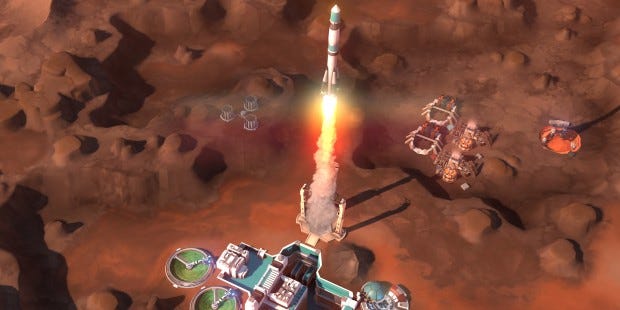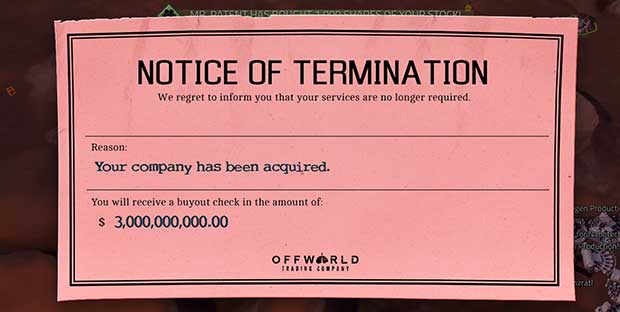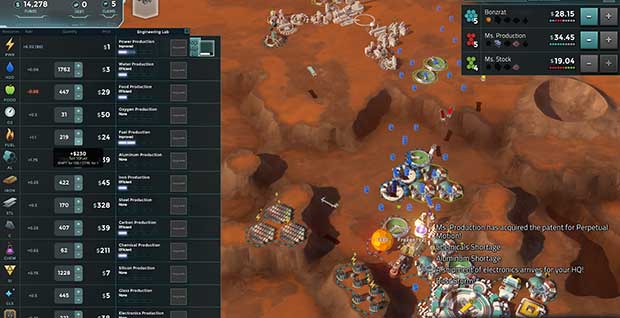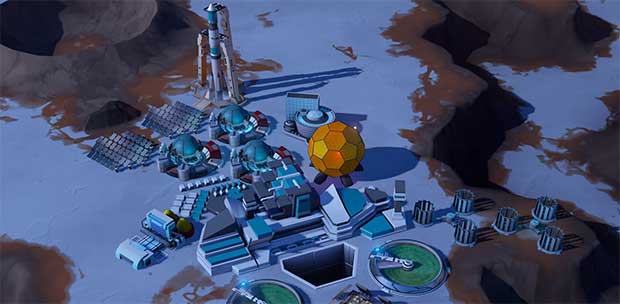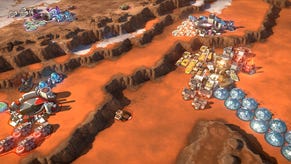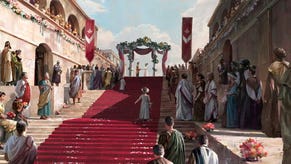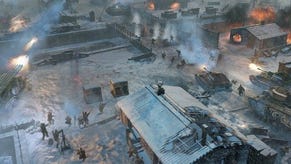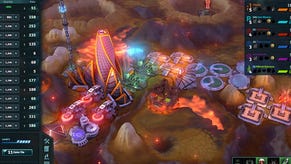Interview: Offworld Trading Company
Trading Places
Offworld Trading Company [official site] is a competitive, multiplayer RTS set on Mars, but instead of fighting with lasers, players compete to dominate a fluctuating commodities market. The winner is the person who buys low, sells high and uses their gains to launch hostile takeovers of their opponent's companies.
At GDC, I spoke to designer Soren Johnson (formerly of Civilization IV) and artist Dorian Newcomb (formerly of Civilization V) about Early Access, how player's had surprised them in the months since its initial release, why they wish the game was hidden on Steam, and what small companies can do that big .
RPS: How's Early Access going so far?
Johnson: It's been good so far. The nicest response we see is people saying, 'Oh, this is fresh. I've never seen something like this before.' They're really excited about that. Our big concern going into selling the game was, we're specifically trying to make a game that's different. There isn't an economic RTS, there really isn't something quite like that, and we're doing that because we're a small team. We're not going to make a StarCraft RTS, it's just not going to happen, so we want to do something different. And everyone says they want something different, but do they actually want something different? Are they ready to buy something different? So from a sales perspective, it's been great. It's been more than Stardock projected internally, and just from my own point of view, it was basically hanging around the top 25 for three weeks. It was great to see.
The forums are full now, lots of people talking about things they like, things they don't like. A very common thing we heard, and this is why we're doing early access, is some people were not totally helped with how the victory condition works. They felt the game ended really suddenly. I really like the way the game ends, but people play games for different reasons. If you're playing the game very cutthroat-- You win the game by buying out all the other companies and so you buy out their shares on the stock market, and eventually you hit a button to launch a hostile takeover, but you need a certain amount of cash. So once you have that much money, you can take them over, but it's kind of sudden. Most RTS games, you kind of slowly killed, right?
Newcomb: There's an angled ramp up and an angled ramp down and it's very linear in both directions.
RPS: That can be frustrating as well.
Johnson: You can see it coming.
RPS: You get over that curve and see you've won and you just need to keep playing for 45 minutes.
Johnson: But with Offworld it's like, bang, right? [laughs] It just suddenly happens. Once you've played the game for a while, you know when you're in danger of getting bought out, but for someone who's fairly new to it, they jump into multiplayer for the first couple of games, it can come pretty sudden. I think these are people who are coming from more the Tycoon, Anno, city-builder games. They like the idea that there's competition but they're not necessarily wanting to wipe everybody else out.
So long story short, we're adding a new victory condition that's coming out in a patch next week. It's a timed mode.
Newcomb: My experience is that the early access has been very exciting for the team, but there's a lot of pressure to fix things that are broken. Internally we've been playing the game for about nine months, a lot, and there's tons of things we've put off doing because, developing the game, it's good enough to know that these things are working.
We spent some time trying to make sure that we've got the right information for players to be able to play the game successfully, are we conveying that in the interface, is it there in the wrap-up screens? But when you release it for new players, you instantly see that there's these huge gaps. In what we thought we were saying and in what we're actually saying.
RPS: Are you surprised by the some of the things people care about versus the things that they don't?
Newcomb: As an artist, I was surprised because when I look at the game, I see something that's a third of the way there. I know that most of the artists who are working on the art team, they're like, 'oh, this is a very good start.' We're developing a style that's going to work with the game, I believe, but so much of it is rough and when we get feedback, it's like, 'oh, the game looks pretty good.' I'm shocked.
It's nice because it's a reminder that some of the work that's in there is good, and it holds up, but I'm actually really surprised there weren't more complaints about all the visual gaps that I feel like are present. We don't have a lot of really nice transitions, things are a little more jarring, and the people don't complain as much about that, and I'm like, OK, our goal is to make it a lot smoother, and I'm hoping that when we do, it just makes it better. I'm just surprised that wasn't a barrier for people in the way it was for me.
Johnson: I wasn't sure whether people would go for multiplayer. Would they be able to figure the game out? And that's gone pretty well. And I see this over and over again now, that people are getting information of the game from YouTube and Twitch. That's how they're figuring out how to play it. We have a tutorial that's very barebones, but that coupled with people who play the tutorial and then they talk about it, that seems to be what people do. And it's an adjustment for me. I'm not used to watching a lot of video of games, but it's such a common thing now, you almost have to factor it into development.
RPS: In watching the videos, have you been surprised by the strategies people are using while playing the game?
Newcomb: You get to see totally different strategies and things that didn't think would be issues do rise up. Building solar panels as one of your first builds turned out to be great because so many new people were playing and everybody was running negatives on energy. So everyone hadn't played how we were in the office, there were opportunities to sneak some money here or there. But then once people realised you could sneak it this way, there's other strategies that were developing.
Johnson: Yeah, we talk surprises, the thing I was looking forward to being surprised by were what ways people figure out to play the game that we hadn't anticipated yet.
This is a good example, since you brought it up. When you put down your headquarters, there are basically places on the map that are really good for energy. You'd look around, 'I'll put my solar panels here, I'll put my wind turbines there,' but what people figured out quickly was that, 'I'm just going to put them next to my headquarters.' Because it won't be as good, but then I can adjust later. I can delete them and build a different building later if the price of food goes up, or steel goes up or glass goes up or whatever. We're seeing people adapt a lot more as the game goes than we were doing internally, and that's just cool to see. Now I play differently. I had to.
RPS: Do you foresee continuing to balance the game in response to dominant strategies for years to come?
Johnson: Part of the reason I wanted to make an economic RTS is, to some extent - there's still issues with balance that are continually going - but to some extent it's self-balancing, right? Because you've got thirteen resources, they've all got a price, and the core of the game is making resources and then selling them. And you win if you make the resources that sell the game. Long story short, right? There's a lot more involved but that's the basic thing, you've got to figure out how to sell the resources you make for the most amount of money. But the thing is, every time someone sells a resource in the game, it drives the price down. So there'll never be a situation where everyone's like, electronics is the best.
But having said that, we're absolutely looking for, does everyone who plays the game open in the same way? Is everyone picking--
Newcomb: Scientific right now is a little more popular.
Johnson: Scavenging is starting to go up, so I think we're in the next phase of the metagame, but yeah, is everyone picking the same headquarter type? If those things happen then yeah, we're going to keep adjusting it.
RPS: How do you track that stuff? Do you have internal metrics?
Johnson: We have some Steam stats that will show win/losses for each headquarter type, and how many of each type of building has been built, and how many of each patent has been researched, and how many of each sabotage item has been bought. So yeah, if I look at the patent chart and one of the patents has only been researched 1% of the time, then I can adjust it. We don't have a super complex metrics system, we just want to make sure that the stuff we're hearing from the community is backed up by the stuff we're seeing in the data.
RPS: What's the line between your vision as the designers and what the community wants?
Johnson: I try to take a high level view. I find that often times, people put themselves in this false opposition with their community where, I want it one way, this is my vision, they want something else, and we can't both be happy. I'm going to have to either sacrifice my ideals or blah blah blah, but half the time there's usually some third way.
For example, I believe that there are lots of ways to play. A deep game can be played so many different ways, so I like giving game options. I usually look at, what are the most common player types, and how many of those player types can we satisfy with this game? And maybe that means we need different victory styles because we can't make them all happy with one mode. That's totally fine.
Beyond that, I'm not generally too precious about specific ideas I have in the game if it's clearly not working. To me, there's the idea of the game that we have now, but it's only my best guess. This is what early access is for. As soon as I heard about early access I was like, we absolutely will be doing that for our game, because I won't know the game we have until a large number of people start playing it.
I'm interested in a game that involves economics and is deep enough that people can play for years, and that means that I'm not going to forcing people, there's no one specific thing that I need to have done that way. If the community is like, 'We hate business games, give us guns,' well, OK, then we have an issue.
Newcomb: We don't have enough games with guns.
RPS: What's your responsibility to the Early Access community as far as their expectations go?
Newcomb: We're developing a roadmap now, which we haven't shared, so we have a rough roadmap in abstract, but we don't have it laid out so people can see, 'oh, this is what they have in the next three months, six months, nine months.' I think one of the things we did OK, and hopefully people think that: it's clear that we're early access, and the video that we showed wasn't a trailer for a kickass game, it was, 'we're developing this game and we want feedback.' And so we're hoping to try to be obvious with that. We're developers that are hoping to have a company making interesting games for the long-term. We want a game that people play long-term. To make a casual game that caught people's attention for two weeks, we would be massively disappointed.
Johnson: I actually kind of wish that Steam was being a little more...
Newcomb: You want us hidden.
Johnson: Yeah. I think it would actually be cool if you could be on Steam but not be visible. Obviously you can share a link, but you're not on the frontpage, you're not listed among their top sellers or whatever. Marketing, they'd kill me for saying that, but you need some gap. We were selling on our own website, which means a tiny amount of sales, and then suddenly we were on the frontpage of Steam, so then there was like, [explosion/wave crashing sound], just a deluge of players. There needs to be some middle stage there.
Even beyond that, we feel like a lot of people buying in early access, they're just buying games, right? They go to Steam, they see the game's there, they see the price, it just looks like any other game except for this one little thing that says "early access," and I feel like it should be much more clear. Like the background should have a different colour or something that makes it very, very clear that this is not a complete game.
Newcomb: A lot of my friends hate early access games, and they're like, 'So! I hear you're doing this terrible thing.' Well, I can say I know why we're doing it. We're doing it so that we're building a community that's playing the game, and we're actually creating a competitive field that's larger the bubble that we have in our studio. Or larger even than if you've got a really large QA department. You're still not going to get the emergent strategies that very competitive people are going to bring to bear, and we need to get a lot of that feedback.
You don't want that feedback to come at the expense of someone's experience, and you don't want someone to feel like they've been jipped. 'Oh, this game's half-baked. Call me when it's done.' I don't want to sell to that person and have them feel like they've been lied to.
Johnson: We only want to go to early access with games that are fun in the state they're in. There's more stuff we're going to do, matchmaking or music or a full tutorial or whatever--
Newcomb: Voice acting!
Johnson: Voice acting! But at the same time, I really only want people to buy who are excited about being part of the process. If they want to get the game when it's totally ready, I want them to wait. We'll let you know when the game's released, please buy it then.
RPS: A lot of the people don't know when a game is ready for them. They see it in early access and don't know what that means, whether it's fun already or barely functional.
Johnson: There's no metric, yeah. With some companies, they have a game that's almost ready, they're like, 'why don't we put it on early access? We may as well.' And then of course, there's games that never get finished on early access. That's a huge range. How are you supposed to judge that?
But in early access, it makes you face the importance of that, right? An issue like late-game UI lag, is an issue that we really probably could have ignored with a small test group right up until release. Right now we're forced to face the fact that we have to fix this. In the next year we'll be able to do it, but we could easily have waited until final release and been like, oh crap, we really should have fixed that before we released the game.
RPS: Do you have a philosophy of design that you think will carry through not just Offworld Trading Company but all Mohawk Games future releases?
Johnson: I would want to say that we're built to make innovative strategy games. Innovative is sort of a loaded term, but the main thing is we want to make strategy games but we're not going to make games that are just like other, bigger games you can buy, because that why would someone buy our game? We want to make something that's really compelling for people that are core strategy games, and I think our best bet right now is to look at things that haven't been done before. Or really big twists on stuff that is successful.
Newcomb: And I think you want to make competitive, interesting strategy games that larger companies can't make or won't make. Having worked with so many people that have worked with Sid Meier and have done Civilization designs, almost every one of those designers' have a bunch of very strong ideas, that if you went to publish them for a 50-person, 60-person team, the publisher would say no. But for the most part, they're games that as a game player, I want to play. You hear the idea and you're like, 'I would like to play that game.' So we're trying to maintain a size and be agile enough that we have the opportunity to make those.
As far as a company goes, I want Mohawk to be what I thought game development looked like before I got into it. So you imagine, it's a bunch of people in a room, they love games, they love the games they're making, and they're really passionate about the product, and there's someone in there that has a really strong vision for game design, and it's going to be a game that people haven't played before. And when you get into the game development environment, a lot of times it's not the case. A lot of times you're working a franchise, and because you're working a franchise you can't make chancy decisions. So the idea is that if we're making our own new game, we can make all the chancy decisions we like, and we should make them.
RPS: Thanks for your time.
You can find Johnson's thoughts on the closure of his former employer, Maxis, over here. Or you can read Alec's thoughts on the Offworld Trading Company early access build.
